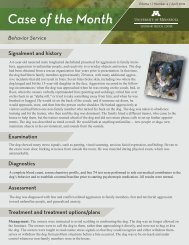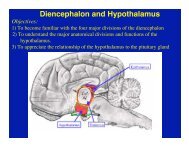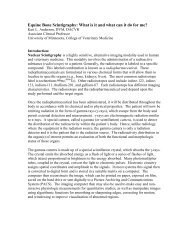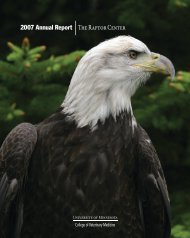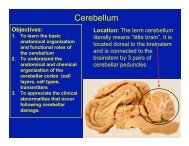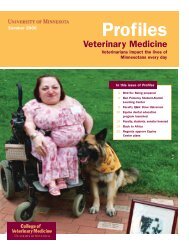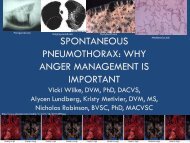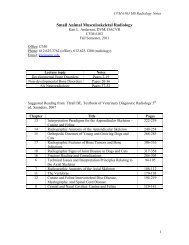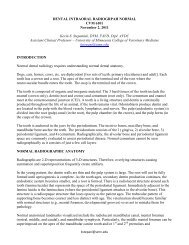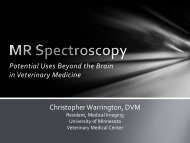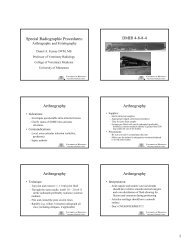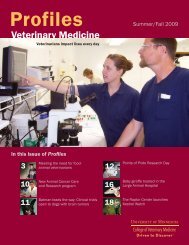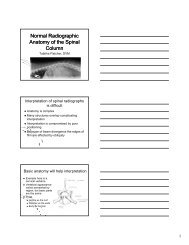Equine Connection-Spring 2011 - University of Minnesota College ...
Equine Connection-Spring 2011 - University of Minnesota College ...
Equine Connection-Spring 2011 - University of Minnesota College ...
- No tags were found...
You also want an ePaper? Increase the reach of your titles
YUMPU automatically turns print PDFs into web optimized ePapers that Google loves.
DRIVEN TO DISCOVERa nuisance to farriers, who have difficultywhen the horse snatches its limb away andslams it to the ground. However, if shiversprogresses, owners may not be able topick up the feet, and the exaggerated limbflexion will be apparent even when thehorse is standing still or walking forward,to the point that it impairs performance.Draper is collecting information on shiversthrough a Web site where owners canupload videos <strong>of</strong> their cases <strong>of</strong> shiversfor evaluation. Working with a team <strong>of</strong>veterinarians and kinesiologists at the<strong>University</strong> <strong>of</strong> <strong>Minnesota</strong>, Draper andValberg will tackle this perplexing diseaseby statistically analyzing informationon shivers cases from hundreds <strong>of</strong> horseowners to determine risk factors andpossible treatment strategies. For moreinformation, visitwww.cvm.umn.edu/umec/shivers.<strong>Equine</strong> genetics andgenomicsResearch in the <strong>Equine</strong> Genetics andGenomics (EGG) Laboratory focuses ongenetic mutations underlying simple andcomplex genetic diseases, the geneticsbehind breed differences in the domestichorse, and how these genetic mutationscause disease.Simple genetic diseases, such ashyperkalemic periodic paralysis andsevere combined immunodeficiency,are caused by a single gene. EGGresearchers have discovered thegenetic mutation responsible for type1 polysaccharide storage myopathy(PSSM), a muscle disease that results inmuscle pain, cramping, and muscle celldamage with exercise —and in someinstances, progressive muscle atrophy.Although the genetic mutation has beenidentified, ongoing research focuseson understanding muscle dysfunctionin PSSM. Research is also underwayto identify the genetic basis <strong>of</strong> anothermuscle glycogen storage disease, type 2PSSM.Most <strong>of</strong> the genetic diseases underinvestigation in the EGG laboratory arecomplex. Complex genetic diseases areA horse’s hocks are injected to treat the onset <strong>of</strong>arthritic changes.<strong>of</strong>ten caused by more than one geneticmutation, and development <strong>of</strong> diseaseand disease severity are <strong>of</strong>ten affected byenvironmental factors. When an individualinherits a genetic mutation for a complexdisease, it is not a guarantee they willdevelop the disease, but that they are atincreased risk.<strong>Equine</strong> metabolic syndrome (EMS) is acomplex genetic disease currently underinvestigation in the EGG laboratory. EMSis a devastating disease characterizedby three main features: obesity, insulinresistance, and laminitis. Certain breedsor individual horses are predisposed toEMS, and are <strong>of</strong>ten referred to as “easykeepers.” These horses are very efficient atutilizing calories and <strong>of</strong>ten require a lowerplane <strong>of</strong> nutrition to maintain body weightthan other horses. This tendency to be aneasy keeper likely begins with a geneticpredisposition.The EGG laboratory is leading alarge-scale investigation into the role<strong>of</strong> environment (diet and exercise)and genetics in EMS, with the goal <strong>of</strong>identifying the genetic mutations thatunderlie disease risk. Other complexgenetic diseases under investigationin the EGG laboratory includerecurrent exertional rhabdomyolysis,osteochondrosis dessicans, equinerecurrent uveitis, shivers, andsusceptibility to melanoma.EGG research is focused onunderstanding the genetic diversityin modern horse breeds and the genesunderlying desirable traits in differentbreeds. The EGG lab is leading aninternational collaboration, the <strong>Equine</strong>Genetic Diversity Consortium, whichconsists <strong>of</strong> more than 30 scientistsfrom over 25 institutions worldwide.The consortium is studying the geneticdifferences and relationships between40 different horse breeds from acrossthe globe.This project represents the largestand most comprehensive data set ongenetic diversity in the modern horse,which will allow insight into the overalleffect <strong>of</strong> current breeding practices.For the first time, researchers will havesystematically identified the regions <strong>of</strong>the genome that have been influencedby selective breeding during the history<strong>of</strong> the domestic horse, which will enablethem to start untangling the genetic basis<strong>of</strong> enhanced performance in certainpopulations and disciplines.This horse is part <strong>of</strong> a research project beingconducted by Dr. Molly McCue, who is investigatingequine metabolic syndrome, a complex geneticdisease characterized by obesity, insulinresistance, and laminitis.9



